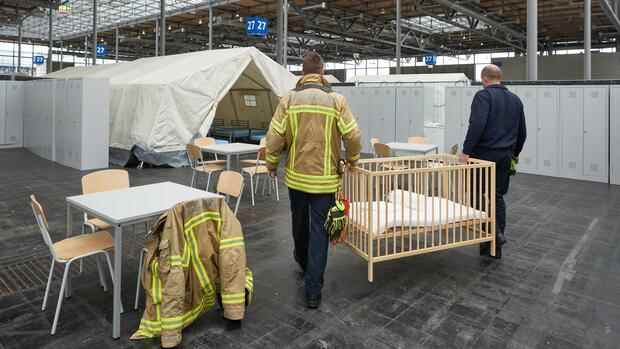Berlin Julian Pahlke experienced moving scenes: people fleeing Ukraine, who often arrive at the Polish border with nothing more than a suitcase. “But they are greeted by an impressive willingness to help, with food, clothing, transport to Poland or even to Germany,” says the Greens member of the Bundestag.
He is a member of the Committee on Home Affairs and Homeland and the Europe Committee and got an idea of the situation on the ground at the weekend: “It’s European solidarity that I wish for all refugees.”
More than 1.5 million people have now fled the war in Ukraine. It is the “fastest escalating refugee crisis in Europe since World War II,” wrote UN High Commissioner for Refugees Filippo Grandi on Twitter on Sunday.
According to the Polish border guard, 129,000 people were processed on Saturday alone on the approximately 500-kilometer-long border with Poland – more than ever before in one day. The clearance involves confirming the identity of the persons, checking documents and checking the databases to ensure that they are not wanted persons.
Top jobs of the day
Find the best jobs now and
be notified by email.
It was expected that the threshold of one million refugees admitted in Poland would be exceeded on Sunday. Almost 230,000 people fled from the Ukraine to Romania, 163,000 to Hungary and 114,000 to Slovakia.
On Thursday, the EU interior ministers activated the so-called “mass influx” directive that had been enacted as a result of the wars in the former Yugoslavia. Refugees from Ukraine receive a temporary right of residence and access to social benefits and the labor market in EU countries without having to go through an asylum procedure.
But in Germany, many municipalities and volunteers felt left alone for a long time. According to the Federal Ministry of the Interior, the Federal Police have so far registered around 38,000 refugees from Ukraine. However, the actual number could be higher because there are no controls at the internal borders and refugees from Poland or other EU countries may have traveled on.
Read more about the development of the war in Ukraine:
Combat room Telegram – How Russians and Ukrainians wage their propaganda war
Mayor of Mariupol reports from the besieged city: “You rip my heart and soul out”
A turning point in asylum policy: EU countries activate special protection status for refugees for the first time
Berlin, Dresden, Nuremberg and Munich are particularly in focus. Long-distance trains from Poland, Austria or the Czech Republic end there. Deutsche Bahn has now also set up a shuttle service for refugees between the German-Polish border in Frankfurt an der Oder and Berlin.
On Saturday, a regional train brought people from Ukraine from Przemyśl in Poland to Cottbus for the first time. More trains are to follow. In Berlin, the Governing Mayor Franziska Giffey warned not to leave the city alone to deal with the influx: “It’s only possible together at the moment,” said the SPD politician in the ZDF “Morgenmagazin”. “We are increasingly reaching our limits.” In the beginning, 45 people had to be accommodated, but now more than 10,000 come a day.
On Sunday afternoon, the Berlin Senate Administration tweeted that refugees from the capital who had no fixed destination in Germany would be taken to 13 other federal states by bus. Bavaria and Hamburg are left out. The offer is voluntary and there is no registration.
Politicians warn to quickly clarify the details of the implementation of the EU directive into national law, but also to support other EU states that have taken in many more refugees. “We must quickly coordinate and structure the humanitarian aid,” said SPD parliamentary group leader Detlef Müller.
The many helpers who took people out of Ukraine or brought relief supplies into the country showed Germany’s great solidarity. “But the aid must now be professionalized quickly.”
Those in need receive benefits under the Asylum Seekers Benefits Act
The EU and Germany are asked to support Ukraine and neighboring countries with humanitarian aid such as food, infrastructure, personnel and medical care, said the parliamentary director of the Greens parliamentary group, Filiz Polat, the Handelsblatt.
The admission of refugees in Germany requires close cooperation between the federal, state and local authorities. This not only applies to accommodation, but also to psychological support and access to integration language courses. “The offers for this must be financially expanded,” said Polat.
Her party colleague Pahlke also emphasizes that there should be no distinction between first and second class refugees and no “racist controls”. “Refugees without Ukrainian citizenship should also be given the opportunity to flee and stay safely.” In addition, people fleeing Russia for political reasons should also be given protection in Europe.
The Federal Ministry of the Interior points out that the temporary protection under the EU “mass influx” directive applies to Ukrainian citizens and their family members as well as to persons from third countries who had protection status in Ukraine or who have resided there lawfully, for example as students.
The application for temporary protection must be submitted to the foreigners authority responsible for the respective place of residence. Needy people who have been registered in a reception facility or with an immigration authority receive support and medical care in accordance with the Asylum Seekers Benefits Act.
More on this: Possibilities of escape, money, transport of goods – this is how the German economy helps the victims of the war
